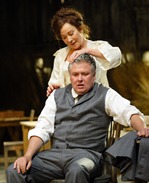SITE GUIDE
SEARCH
REVIEWS
REVIEW ARCHIVES
ADVERTISING AT CURTAINUP
FEATURES
NEWS
Etcetera and
Short Term Listings
LISTINGS
Broadway
Off-Broadway
NYC Restaurants
BOOKS and CDs
OTHER PLACES
Berkshires
London
California
New Jersey
DC
Connecticut
Philadelphia
Elsewhere
QUOTES
TKTS
PLAYWRIGHTS' ALBUMS
LETTERS TO EDITOR
FILM
LINKS
MISCELLANEOUS
Free Updates
Masthead
Writing for Us
A CurtainUp  London Review
London Review
 London Review
London ReviewThe Cherry Orchard
|
Hear what I have to say about the Cherry Orchard, because it is mine. I say bring it down, tear it down. Smash it down and tear it down. Watch, watch. Just you watch. I will build holiday villas, as far as the eye can see. I will build a place for everyone to come and enjoy. For the future. And this will be the future. A new life. A new way of life. Here! — Lopakhin
|

Zoë Wanamaker as Madame Ranevskaya and Conleth Hill as Lopakhin (Photo: Catherine Ashmore) |
Upton's version is so full of anachronism, references to banking and business language, someone mentions risk assessment, and there was a groan as Yasha (Gerald Kyd), Ranevskaya's manservant says in a quote from a 1960s hit by The Animals, "Oh Lord, Please don't let me be misunderstood". It grated for me. I know in the programme Howard Davies tells us he wanted a political production, not a pretty costume drama so for instance parasols were banned and the set has enormous telegraph poles to the fore instead of the trunks of the traditional silver birches, or for this play, cherry trees. Davies' point is that this play is set in the twentieth century and there is no room for sentiment.
Zoë Wanamaker plays Ranevskaya returning home broke after ten years in Paris. Her husbands have been a disaster — drunkards, wastrels — and she is flat broke. Her adopted daughter Varya (Claudie Blakley) desperately tries to manage everything and is accused of feeding dried peas to the many squatters on the estate. The future in this play is predicted by the merchant Lopakhin (Conleth Hill), once a serf and now the new economic elite and the eternal student Trofimov (Mark Bonnar), the Trotskyite figure making political predictions for a fairer society. Nowadays Lopakhin would own Chelsea Footbal Club. Anya (Charity Wakefield), Ranevskaya's other daughter will fall in love with Trofimov.
Zoë Wanamaker plays Ranevskaya as shallow as shallow can be, in denial about her situation and unbelievably selfish yet somehow her performance is without charm or grace or attraction. She is always the actress, insincere and spoilt, and ultimately annoying. She makes you think it is a shame the Russian Revolution didn't feature the guillotine. It is hard to imagine that Lopakhin could ever have trembled at her touch when she spoke to him as "Little peasant". Claudie Blakley's downtrodden Varya fails to connect with Lopakhin but their final scene is a non event. Maybe Lopakhin feels he can do better.
I liked Conleth Hill's businessman. Initially he is still in awe of the landowners but by the end of the play he knows he is the new power and starts to brag. Early on he makes a suggestion for economic recovery for the family of selling the orchard and building holiday homes but they won't listen. They are in denial. James Laurenson as Ranevskaya's is almost a simple minded sentimentalist and Sarah Woodward's ex governess Charlotta is bizarre with her circus tricks but appearing genuinely lost when the family can no longer afford to keep her. Mark Bonnar's Trofimov has sincerity in his speech about the brutalised society although we now know that the revolution would not produce a fairer society, just that the elite would be different people.
The Olivier is a sprawling stage and Bunny Christie's country house set is more like that of the Wild West, unplastered, wooden slats forming the walls, open plan, a staircase leading upstairs . The second act is beautifully lit when they have a picnic and behind we see tall stalks of corn with the sun shining on them.
Chekhov described The Cherry Orchard as a comedy. There is little to laugh at in this the cruellest Cherry Orchard I have seen.
|
Subscribe to our FREE email updates with a note from editor Elyse Sommer about additions to the website -- with main page hot links to the latest features posted at our numerous locations. To subscribe,
E-mail: esommer@curtainup.comesommer@curtainup.com
put SUBSCRIBE CURTAINUP EMAIL UPDATE in the subject line and your full name and email address in the body of the message -- if you can spare a minute, tell us how you came to CurtainUp and from what part of the country. |
| The Cherry Orchard
Written by Anton Chekhov In a version by Andrew Upton Directed by Howard Davies Starring: Zoë Wanamaker, Mark Bonnar, Conleth Hill With: Emily Taaffe, Pip Carter, Charity Wakefield, Claudie Blakley, James Laurenson, Sarah Woodward, Tim McMullan, Gerald Kyd, Kenneth Cranham, Craige Els, Paul Dodds, Mark Fleischmann, Colin Haigh, Jessica Regan, Tim Samuels, Stephanie Thomas, Joseph Thompson, Rosie Thomson, Ellie Turner Design: Bunny Christie Lighting: Neil Austin Choreographer: Lynne Page Music : Dominic Muldowney Fight Director : Terry King Sound: Lynne Page Running time: Two hours 55 minutes including an interval Box Office: 020 7452 3000 Booking to 20th June 2011 Reviewed by Lizzie Loveridge based on 20th May 2011 performance at the Olivier, National Theatre, South Bank, London SE1 9PX (Rail/Tube: Waterloo) |
|
REVIEW FEEDBACK Highlight one of the responses below and click "copy" or"CTRL+C"
Paste the highlighted text into the subject line (CTRL+ V): Feel free to add detailed comments in the body of the email . . . also the names and emails of any friends to whom you'd like us to forward a copy of this review. |




